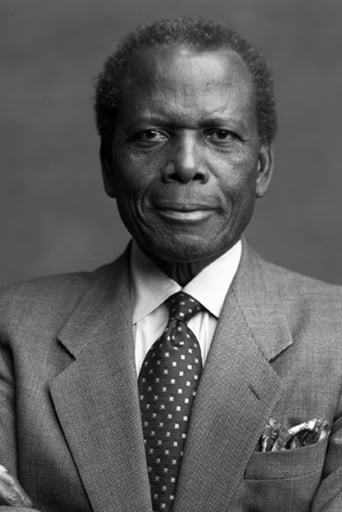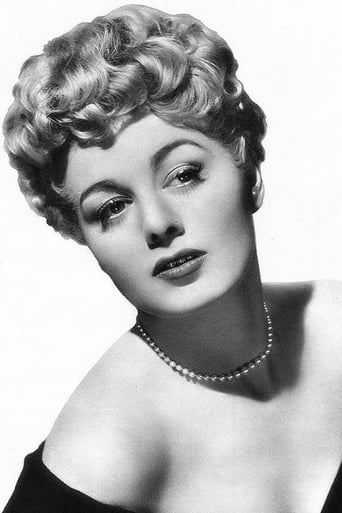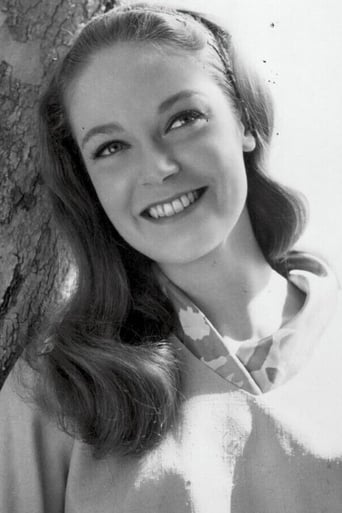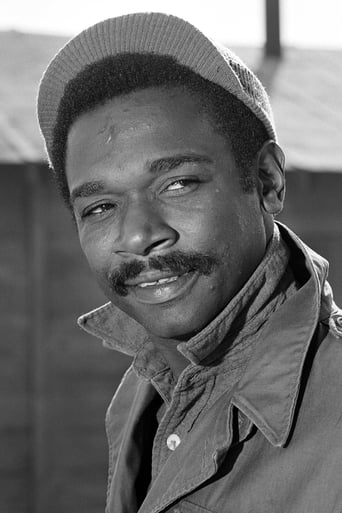lasttimeisaw
The story of A PATCH OF BLUE has its immediate signifier of a tale of woe, a 17-year-old white blind-girl Selina D'Arcey (Hartman), living with her heinous mother Rose-Ann (Winters) and drunkard grandpa Old Pa (Ford) in a tiny apartment, doing all the chores and extra beadwork under the tyranny of Rose-Ann, there is no light in her life, she has received no education, never ever heard of Braille, even her meagre request of going out to the park nearby to finish her beadwork has been bluntly spurned by her mother.Thankfully, Old Pa is not pure evil like Rose-Ann, he brings her out to the park, leaves her there under a tree, and would pick her up later that day on his way back, usually completely plastered. At least in the park, Selina can finally breathe some fresh air, bask under the sun and daydream that only if she could still see the world, yes, she is not born-blind, it is all because an accident at the age of 5, guess who is the perpetrator? yes, Rose-Ann, her own mother.Right in the park, she meets a kind stranger, Gordon Ralfe (Poitier), whose affable presence and obliging gestures light up Selina's spirit from her wretched domestic tangle, he helps her organise the beads to accelerate her work, offers her pineapple juice which she has never drunk before, and thoughtfully informs her where is the nearest lady room, a cordial friendship kick-starts, but little does she know, Gordon is a black man.During their regular park meetings, Gordon takes her to walk around the neighbourhood, to establish her sense of orientation, teaches her how to cross the zebra crossing, they shop together in the supermarket and cook lunch in his apartment. Gradually, Selina opens up to him about her back-story, her lack of sophistication can even make the most horrendous thing sound like a cakewalk. It shocks Gordon, and stings him to take her under his wings against all the difficulties, an ultimate plan is to save her from the grasp of Rose-Ann, before it's too late. Meanwhile their mutual affinity is burgeoning into something more tangibly affectionate, devoid of any natural reserve, Selina declares her love for him with utter candour, even, in the touching moment, she tells him she doesn't care about his skin colour. What will he do? Thankfully, Gordon is sensible enough to make the right decision which is deemed best for her benefit.Cinematographer-turned-director Guy Green has an extraordinary knack of not sensationalising these obvious pivotal points, instead, he segues the reactions smoothly on to the proceedings in a most naturalistic fashion, take the moment when Selina realises Gordon is black from Rose-Ann's inadvertent blurting, barely a second is given to show Selina's electrified realisation during the on- going squabble which evolves into a symphony of cursing and smashing between Rose-Ann, Old Pa and their neighbours. The scenario is highly dramatised, but in light of Green's discernment, the narrative never falters into something mawkish or overripe.The late Elizabeth Hartman (who woefully committed suicide in 1987 at the age of 43) was the youngest actress Oscar-nominated for BEST ACTRESS IN A LEADING ROLE at that time (a record would be superseded a decade later by Isabelle Adjani in François Truffaut's THE STORY of ADELE H 1975), in her poignant debut, her rendition of a blind girl is simply sympathy-arousing, and she shows no cold-feet against a spontaneously charismatic Poitier, whose righteous sense of justice is seething with Gordon's favourite word - tolerance, they converge upon as a scintillating duo on screen, by virtue of Green's dispassionate script, their scenes together radiate warmth, tenderise and vigour. And, being not heavy-handed with the racial card, the film can find more strength in its reverberations with today's audience.Shirley Winters wins her second Oscar in her turn as Rose-Ann, she is an out-and-out white-trash monster, it is a showy role, and understandably, she would not disappoint, every time the shot cuts to the dreary apartment where Rose-Ann materialises herself along with her hapless daughter, a gnawing worry emerges from our hearts, one might wonder why in the first place, Rose-Ann is outlined as such an atrocious mother, unrepentant, self-loathing and there is not an inkling of humanity in her, is there a blatant misogyny lurking here? Otherwise, considering that there is already a gaping barrier erecting between Selina and Gordon, to ameliorate Rose-Ann's wickedness might have rendered a more truthful spin to the fictional story, that is something would be more sensible since apart from that, the movie is insistently " calm, cool and collected". Last but not the least, to name-check the prolific veteran Wallace Ford, who concludes his swan song with impactful chagrin and self-destructive acquiescence as a "flop". An epitome Hollywood "message" production garlanded with sincere niceties and unassuming Black-and-white presentation, a humdinger it is!





